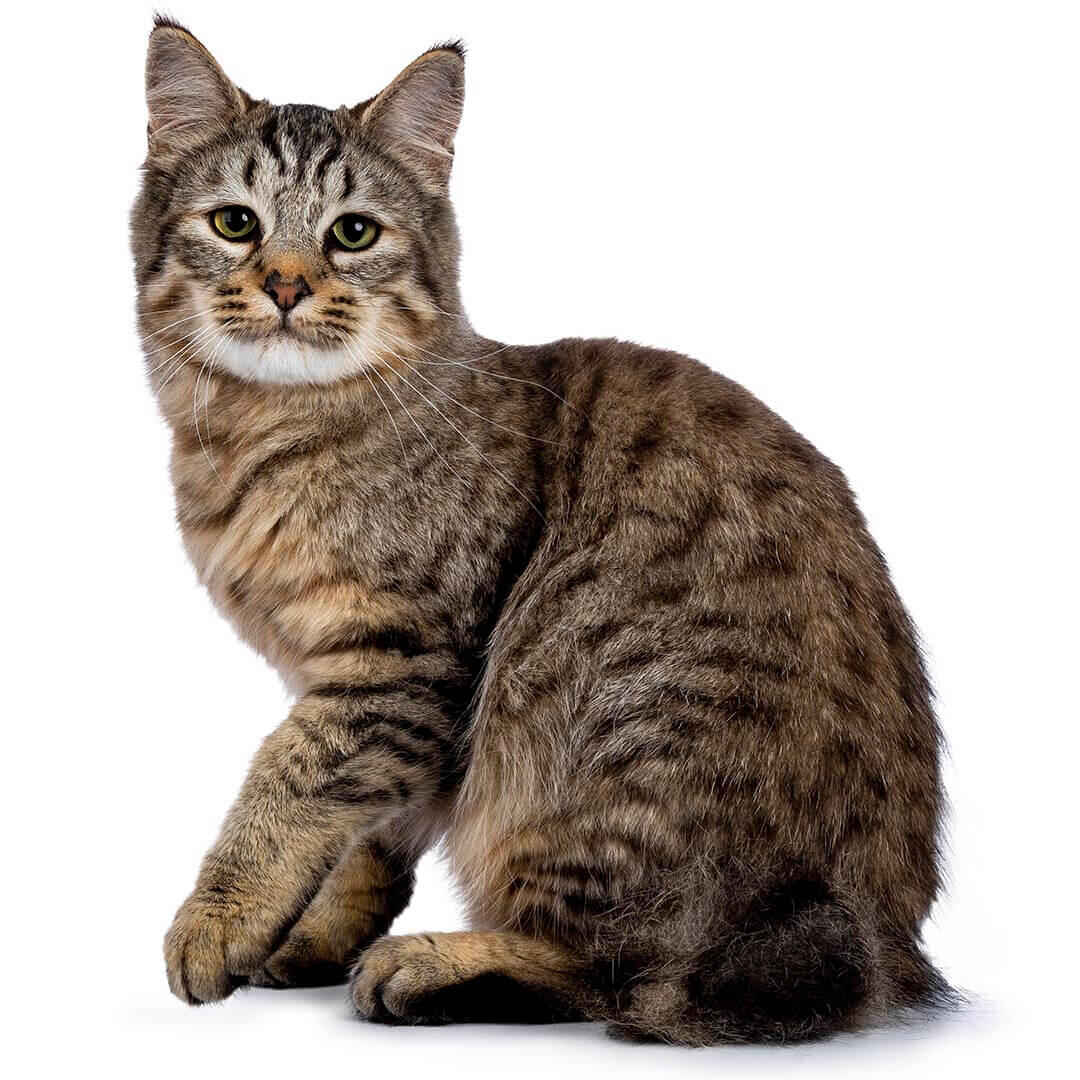
| Family-friendly: | 5/5 |
| Playfulness: | 4/5 |
| Intelligence: | 4/5 |
| Tendency to Vocalise: | 3/5 |
| Likes Other Pets: | 4/5 |
| Grooming needs: | 2/5 |
| Shedding: | 4/5 |
Some Pixiebob cats are polydactyl, meaning that they are born with an extra toes on either their front or back feet. This can cause problems as the extra toes may not be attached to the feet properly and
may not be fully functioning, making them more prone to injury. Because of this, encouraging extra toes in breeding is not recommended.
| Family-friendly: | 5/5 |
| Playfulness: | 4/5 |
| Intelligence: | 4/5 |
| Tendency to Vocalise: | 3/5 |
| Likes Other Pets: | 4/5 |
| Grooming needs: | 2/5 |
| Shedding: | 4/5 |
Social and active, the Pixiebob gets along well with human and pet family members alike. Strongly devoted to their people, this is a curious and intelligent cat who will really love getting involved in family activity, whether that’s filing tax returns or making the bed, as a Pixiebob loves to ‘help’. Despite this helpful nature, the Pixiebob is quite a laid-back cat, enjoying lap time and snuggling in bed. They can also be quite chatty, communicating in a series of chirrups, chirps, beeps and grumbles.
Country of Origin: United States, Washington
The Pixiebob was the vision of one breeder, Carol Ann Brewer, who purchased a polydactyl, bobtailed kitten with wild-type spotting, in 1985. She found another, larger male in 1986 who had similar characteristics, and he sired a female kitten with the requisite features later that year who was named Pixie. From this basis, Carol Ann set out to purchase and breed more cats with this miniature bobcat appearance, producing a breed standard for her new breed in 1989, and naming them Pixiebob after her founding female.
Secure outdoor space is a must for this long-legged, muscular and active cat. A cat-proofed garden or if this is not possible, a purpose-built cat-run, will meet their needs. They will enjoy tree branches and climbing poles and a variety of resting stations around the outdoor area, so that they may survey their kingdom!
Access to outdoor space will give your Pixiebob the opportunity to sunbathe, dust-bath, and exercise, and will help keep your cat in top condition, physically and mentally. They are a theft risk so gardens must be secure.
The Pixiebob will enjoy some outlet for climbing, relaxing at various levels, and food dispensing toys that recreate hunting activities. Surprisingly trainable, Pixiebobs can be taught to walk out on a lead and harness and will respond well to clicker training and food-reward based games. Their friendly and curious nature means they are better off with plenty of human company, so while they will be fine whilst owners work, they will be unhappy if left longer.
Every cat is unique and each has their own particular likes, dislikes, and needs when it comes to food. However, cats are carnivores and every cat must obtain 41 different and specific nutrients from their food. The proportion of these nutrients will vary depending on age, lifestyle and overall health, so it's not surprising that a growing, energetic kitten needs a different balance of nutrients in their diet than a less active senior cat. Other considerations to bear in mind are feeding the right quantity of food to maintain 'ideal body condition' in accordance with feeding guidelines and catering to individual preference regarding wet or dry food recipes.
Whilst the short haired Pixiebob only needs a weekly groom to check through the coat and as a sensible handling/bonding routine, the longer coated type will need grooming more frequently.
A greasy coat is a sign your cat is not self-grooming at all and this may indicate poor health.
As with all cats, regular vaccination and parasite control is recommended.
The Pixiebob is a good breed for families who spend a lot of time at home, and with older children who understand a cats’ need for respect and careful, thoughtful handling. They’ll enjoy playing games and fetching toys, as well as curling up on laps, but as with most cats, will find a very frenetic, loud household quite stressful.